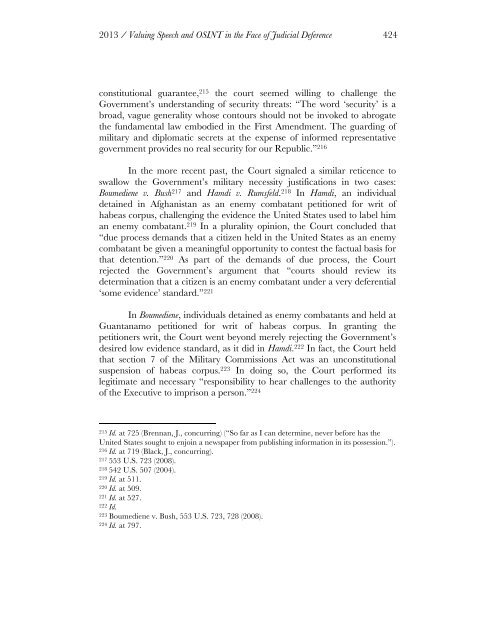Vo.4-Moshirnia-Final
Vo.4-Moshirnia-Final
Vo.4-Moshirnia-Final
You also want an ePaper? Increase the reach of your titles
YUMPU automatically turns print PDFs into web optimized ePapers that Google loves.
2013 / Valuing Speech and OSINT in the Face of Judicial Deference 424<br />
constitutional guarantee, 215 the court seemed willing to challenge the<br />
Government’s understanding of security threats: “The word ‘security’ is a<br />
broad, vague generality whose contours should not be invoked to abrogate<br />
the fundamental law embodied in the First Amendment. The guarding of<br />
military and diplomatic secrets at the expense of informed representative<br />
government provides no real security for our Republic.” 216<br />
In the more recent past, the Court signaled a similar reticence to<br />
swallow the Government’s military necessity justifications in two cases:<br />
Boumediene v. Bush 217 and Hamdi v. Rumsfeld. 218 In Hamdi, an individual<br />
detained in Afghanistan as an enemy combatant petitioned for writ of<br />
habeas corpus, challenging the evidence the United States used to label him<br />
an enemy combatant. 219 In a plurality opinion, the Court concluded that<br />
“due process demands that a citizen held in the United States as an enemy<br />
combatant be given a meaningful opportunity to contest the factual basis for<br />
that detention.” 220 As part of the demands of due process, the Court<br />
rejected the Government’s argument that “courts should review its<br />
determination that a citizen is an enemy combatant under a very deferential<br />
‘some evidence’ standard.” 221<br />
In Boumediene, individuals detained as enemy combatants and held at<br />
Guantanamo petitioned for writ of habeas corpus. In granting the<br />
petitioners writ, the Court went beyond merely rejecting the Government’s<br />
desired low evidence standard, as it did in Hamdi. 222 In fact, the Court held<br />
that section 7 of the Military Commissions Act was an unconstitutional<br />
suspension of habeas corpus. 223 In doing so, the Court performed its<br />
legitimate and necessary “responsibility to hear challenges to the authority<br />
of the Executive to imprison a person.” 224<br />
215 Id. at 725 (Brennan, J., concurring) (“So far as I can determine, never before has the<br />
United States sought to enjoin a newspaper from publishing information in its possession.”).<br />
216 Id. at 719 (Black, J., concurring).<br />
217 553 U.S. 723 (2008).<br />
218 542 U.S. 507 (2004).<br />
219 Id. at 511.<br />
220 Id. at 509.<br />
221 Id. at 527.<br />
222 Id.<br />
223 Boumediene v. Bush, 553 U.S. 723, 728 (2008).<br />
224 Id. at 797.
















